Is Marva Adams-Miller's black cake they love
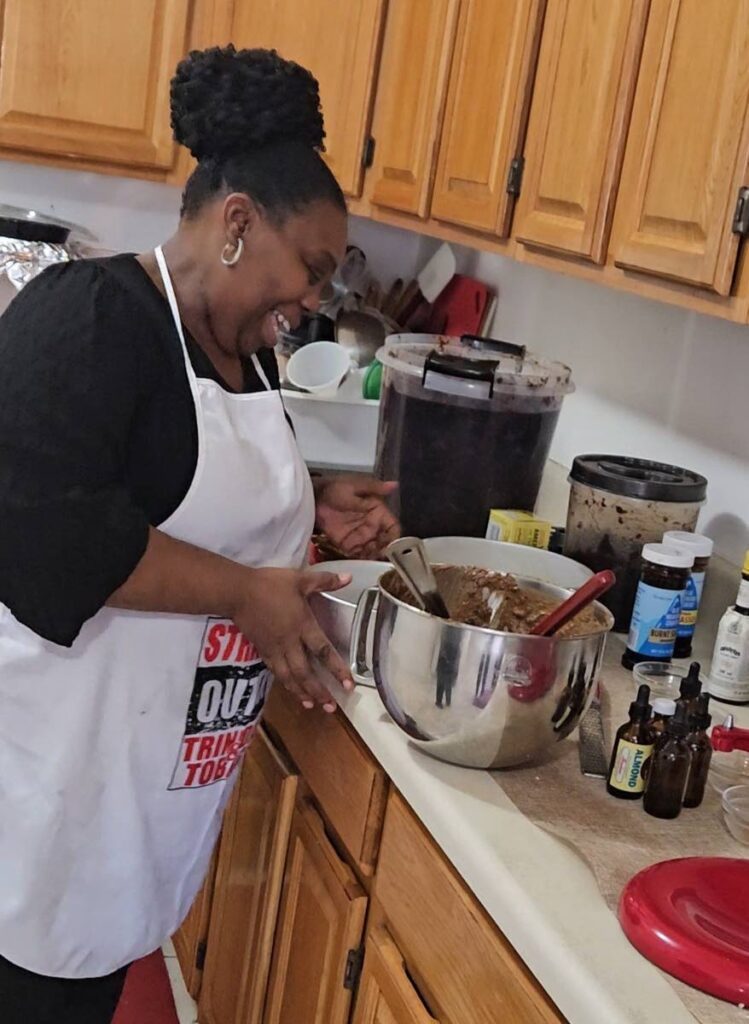
"Is the black cake I love, is the fruit cake I want, you are the master baker, and I'm the fruit cake lover."
The lyrics of Sugar Aloes' classic Christmas tune Black Cake Lover capture the sentiments of Marva Adams-Miller's customer base, a group she has seen about double since she was featured in an article by The New York Times.
The Trinidad-born, Brooklyn-based baker was the first of five Caribbean bakers featured in the article, The Best Black Cake, a West Indian Delight, Starts at Home, published on November 27. Written by Ramin Ganeshram it focused on the seasonal dessert staple and highlighted an "elite group baking Caribbean black cake in late fall."
Also featured in the article were a Guyanese baker, two Jamaican bakers and Trinidad-born, Toronto-based Rhoma Akosua Spencer, better known back home for her work as a comedian, actress, director and playwright.
“There’s only one or two of us that I know of who make black cake in my area so it’s important that I continue,” Spencer is quoted in the article.
Adams-Miller has been selling her black cake in Brooklyn for more than two decades. She told Newsday in a WhatsApp interview the business had its roots when she was a girl growing up in Laventille.
"Laventille of yesteryear is not the one of today. Back in the day, you could walk the street, and nobody bothered you. You could walk late, come home late. The crime rate was not as bad as it is now."
She recalled fun days with good friends and good family and going to school and church in the community.
Her father worked for years in Port of Spain as a head baker at Coelho Bakery, which was a rival to Kiss Baking Company before Kiss acquired them in 1989. He also baked a lot at home and taught his children as well.
"I always loved the kitchen, being around him, seeing him do stuff."
Adams-Miller recalled she was amazed to see the liquid batter go into the stove and come out as a "condensed" item.
"It was an infatuation for me. It was like magic."
Growing up she loved eating black cake though she and her siblings were only allowed a small taste because of the alcohol content. Her father also made a lighter, fruit sponge version which they were allowed to have in larger quantities.
At about age 11, she tried to make a black cake based on observing her father but it "got messed up." She was not deterred, however, and then in 1985 at age 15 she pressed her father to teach her his black cake recipe and he agreed.
"He showed me the ingredients, wine and the rum. The rum cured the black cake, and it could last forever if not eaten. It was my first time actually baking a proper black cake."
Her first cake came out a little too hard as she put too much flour.
"It was looking so moist that I kept adding flour."
But Adams-Miller improved her skills and would bake cakes for church functions and would soak the cake with Malta to get the moistness without the alcohol. She also learned cooking from her stepfather and began catering and baking while working at Royal Bank at about age 20.
She received some additional baking training during her vacations in Moruga.
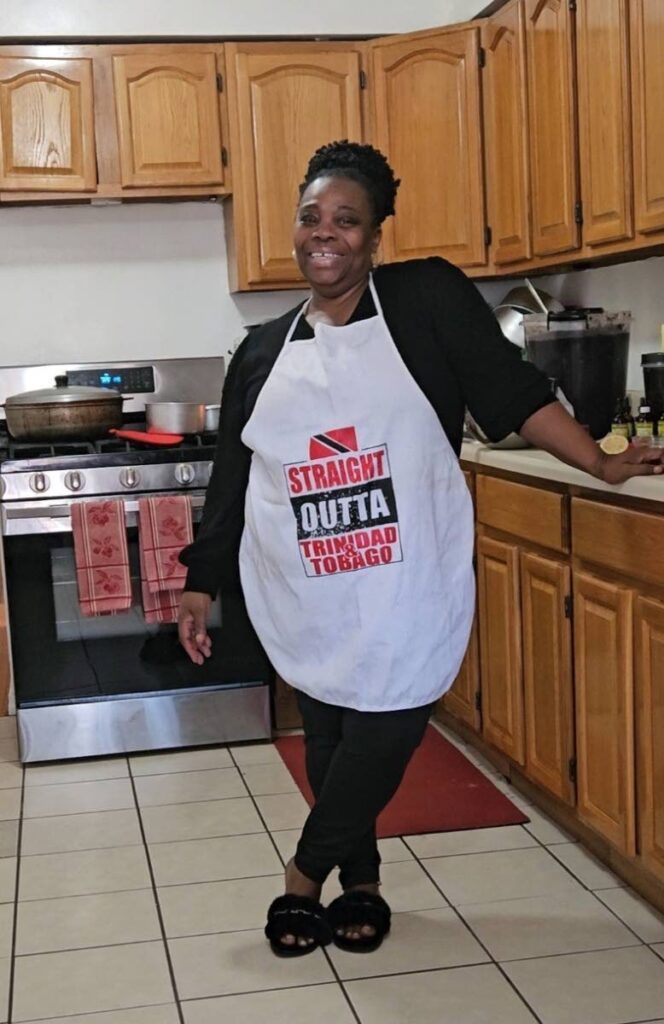
"My beautiful grandmother lived there with my uncles; my gran also taught me to bake bakes and breads."
She described going to Moruga as "Always a joy" and very humbling.
"The stories while sitting around the table with the flame from the lamp flickering and drinking hot, grated chocolate, walking to the neighbourhood parlour with my Granny, and patiently waiting on her while she chatted with the shopkeeper, fuh hours, who in turn will give me a paradise plum sweetie, or a Joe chewing gum, just to keep me quiet."
She recalled going to the river to wash and bathe and going and peep at (reputed obeah woman) Mother Cornhusk's house with her cousins.
"(These) will always be memories I hold dear to my heart. I'm a country girl at heart."
Baking in Brooklyn
She migrated to the US in her 20s but for the first couple of years, she did not bake as a business.
"I just baked and would give out gifts to friends. I was kind of scared and did not know how people would receive it."
She explained that her fellow West Indians were familiar with black cake though the versions in other Caribbean countries were different in terms of texture.
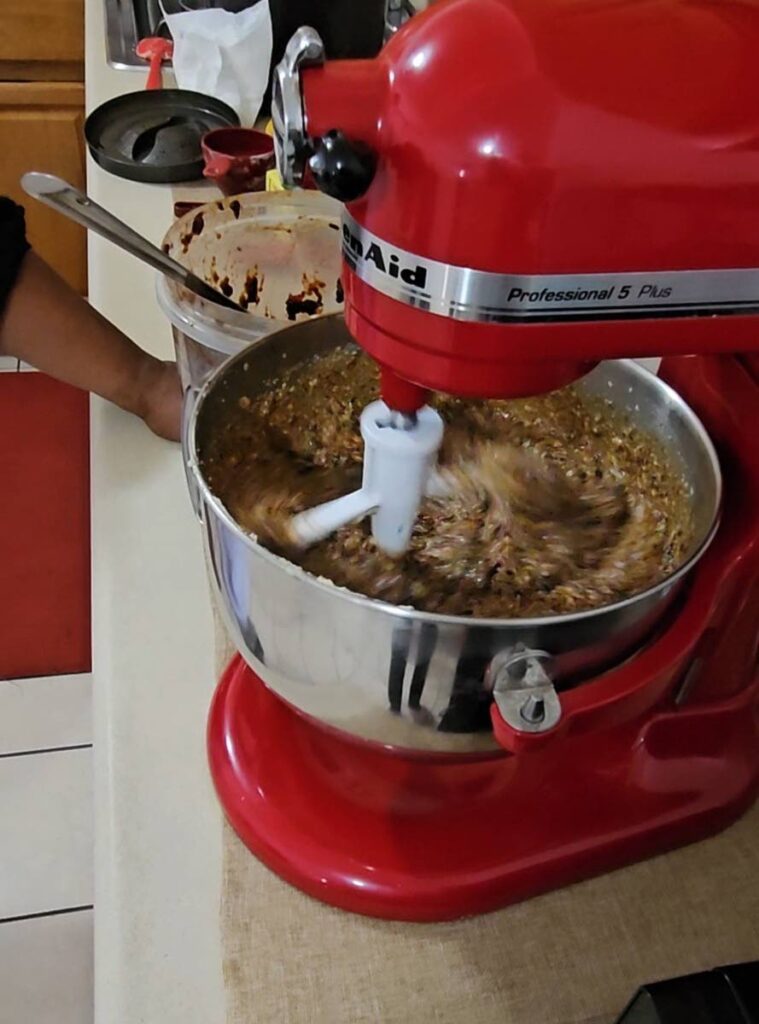
"Our cakes are very, very rich. Cakes from other islands can be more spongy and fruity. Not that nice, 'wedding-y' cake we make in Trinidad."
While working as a nanny and giving away her cakes one of her friends asked if she sold them. She considered the idea and discussed it with her father. He assumed that she had been selling and was shocked she had been giving it away.
"Are you mad? Those expensive fruits, wine and rum?"
Her home business then began, starting with black cakes but annually adding other items like sweetbread, sponge cake, ponche de creme and the occasional banana bread. When she started, she had about 15-20 customers and that number would continue to grow primarily via word of mouth. She also enticed new customers by including a little slice of cake with her fellow participants of a sou sou (informal savings arrangement).
Adams-Miller has a day job as a youth councillor working with children's services and she would typically bake in the evening. In the off-season, she would bake three to four hours a day, but in this high season, which runs from the beginning of November to New Year's Day, she bakes eight to 12 hours a day. She has a cousin who assists with washing up, cleaning floors, greasing pans, and running errands but she does all the baking.
"I do not like people to touch my batter."
Asked about sourcing the ingredients, she explained a lot of places in Brooklyn sell fruits (raisins, sultanas, cherries) wholesale. For the rum, she brings all from TT and only uses TT products, such as essence, baking powder, and spices.
Her black cake recipe is not the same as she learned from her father as she has tweaked it over the years and added different things. She sells it for US$60 and reported receiving a lot of positive comments from customers.
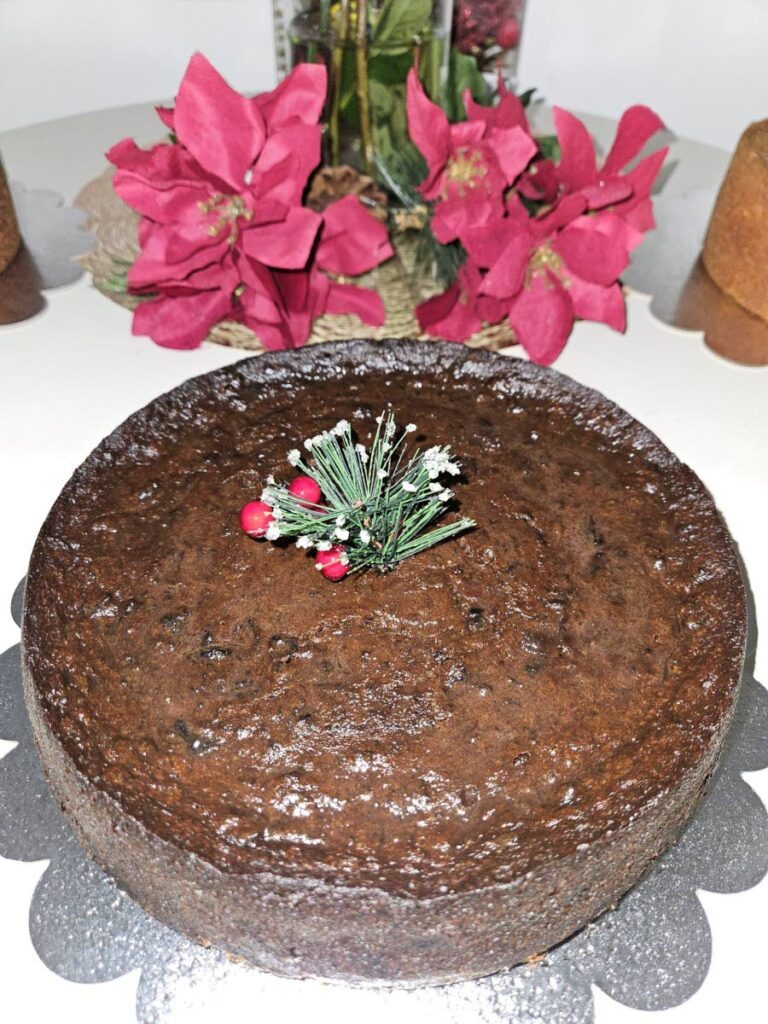
"As I unwrapped the container, I was hit with (the) sweet aroma of the fruit cake. My mouth started salivating. As I take my first bite, I'm transported back to my granny's kitchen. Mmh, the cake is moist, filled with enough fruits and the right amount of liquor to give it the kick it needs. With the first bite, I'm in island Christmas heaven, if it wasn't for willpower, I definitely would eat half the cake. This is definitely the best fruit cake I had," one customer wrote on Facebook.
"Yes your cake is the best," wrote another customer.
Adams-Miller has shipped her cakes to Canada, Sweden, Nigeria, St Lucia, Kuwait, and Dubai, and even has people waiting with orders when she visits Trinidad.
The New York Times factor
Adams-Miller began selling from home and continues to do so. She had considered having a storefront but has been partly discouraged by the seasonal nature of her products.
"What do I do after the season dies down?"
She is giving the idea more consideration since the release of The New York Times article. And how did that come about? Back in January 2021, her friend Colette mentioned that Ramin Ganeshram, a journalist, author and food writer who was born in New York to a Trinidadian father and an Iranian mother, wanted to do an article on the black cake of the Caribbean.
Adams-Miller and Ganeshram began corresponding, but the former did not realise the scope of the article.
"It never really dawned on me I was doing an interview for such a large newspaper. It did not really hit me until now."
She reported the article had many hiccups and suffered a major setback at the end of 2021 when she lost her mother.
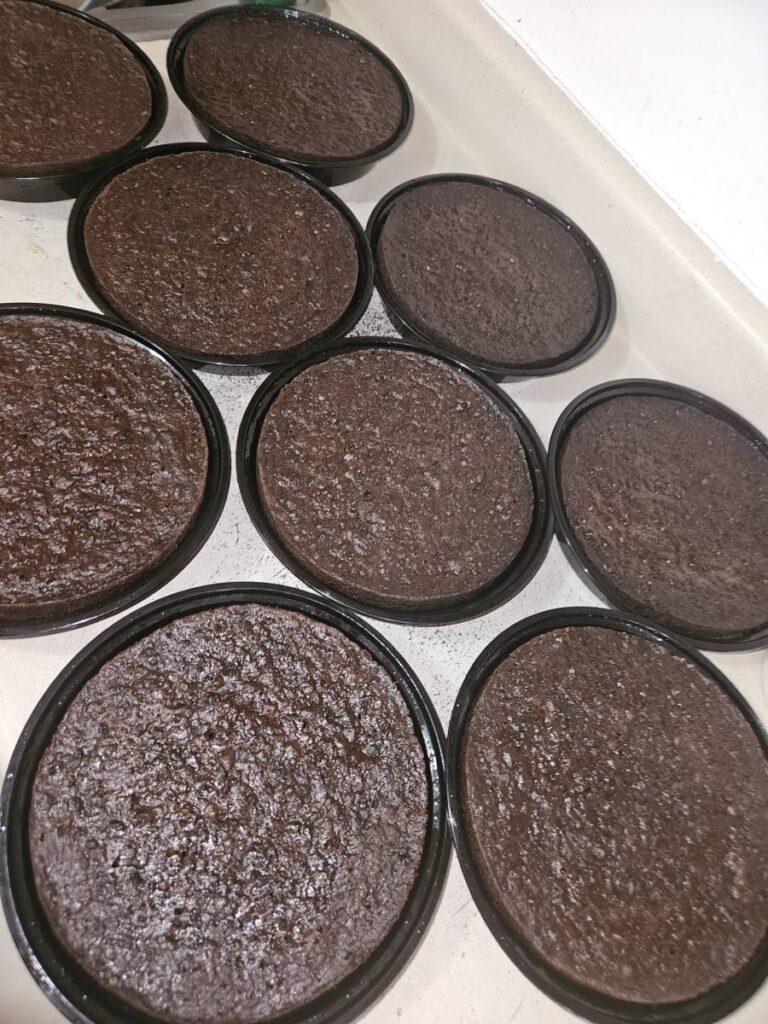
"I did not want to do the article anymore."
However, she was convinced to participate as her mother would have wanted her to get the exposure. And when the article was published last month, and her phone began "blowing up" she realised it was "a big deal". She described the experience as "overwhelming" and as more people began reaching out to do interviews, she had to get a publicist.
Her business greatly benefitted from the exposure and on the day of the article about 15 people contacted her for black cake. Her customer base grew from about 40-60 customers to more than 100. The increase in demand grew so much that she had to rent a commercial kitchen to bake, though she still does some baking during the day at home.
From November 24 (the day the article was released) to the present she has baked about 108 black cakes, and she has other orders for the holiday season.
"It's been a journey."
She said she lives a very simple and easy life and outside of work and going to church she does not do much. She took the opportunity to express thanks to God for the gift of her talent.
"My dad is no longer here with me, but I daily feel his spirit. My mom as well."
She expressed thanks to her family, very close friends and, most importantly, her customers. She also thanked her friend Colette for arranging The New York Times article and the journalist Ramin Ganeshram for "writing such an amazing piece".
Next month will mark 22 years since Adams-Miller has been selling her cakes professionally. So what's next for her? She plans to set up a website to make it easier to receive orders and to improve communication with her customers.
And for bakers this season, both professional and non-professional, what is her secret to the best black cake?
"It is all about love. I put a lot of love into black cake. I take pride and joy when doing it. Any baker should take pride in their craft, whether it is at home or for business."
She added the black cake was about bringing the community together during the holiday time, including those abroad who are not able to go back home or cannot afford it.
"I have given away a lot of black cake in my time. It is not always about money. For me to give away the cake, as expensive as it is, I put my love and heart into it. It's a labour of love."
Adams-Miller can be contacted via her Facebook page Marva Bless Adams-Miller or via e-mail at marvaadams26@gmail.com.


Comments
"Is Marva Adams-Miller’s black cake they love"